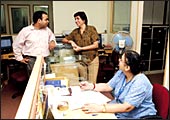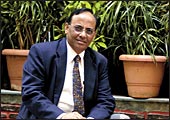 |
| A human employer: Freedom is the buzzword
for Ambwani (foreground) |
Vikas
Shirodkar's daughter takes dance lessons every Saturday at a school
just behind the Johnson&Johnson (J&J) office in south
Mumbai's Tardeo. Instead of dropping her to class, going back
home and then returning to pick her up, Shirodkar, J&J's Vice
President (HR & Administration), decided to spend the hour
in his office, checking e-mails and finishing some work. This
happened three Saturdays in a row. On the Monday that followed,
he got a call from the company's Managing Director, Narendra Ambwani,
asking if all was well. Shirodkar didn't quite understand the
reason for the question till his boss revealed that he had seen
the register at the entrance and found that Shirodkar had been
coming into office Saturday after Saturday. Was he overburdened
and did he need additional staff? the MD wanted to know.
For Shirodkar, it was a touching moment.
Not surprisingly, in the seven years he has been with the company,
in the same role and designation, he has never had a reason to
look for another job.
SNAPSHOT
REVENUES: Not available
PROFITS: Not available |
Total employees: 537
Attrition (per cent): 6 (2005)
Average career tenure: 15 years
Training budget (budgeted/actual): Rs
52 lakh/ Rs 52 lakh (2005)
Training man-hours (actual): 15,000
|
Ditto for most other employees in the company.
The average tenure of employees here is an eye-popping 15 years-quite
an achievement in times when job-hopping is the norm. And the
credit for this, says Shirodkar, goes to the company's Credo,
a document which defines the way it functions, its responsibilities
to, first, the consumer, then its employees, then the environment
and society and finally, its shareholders.
The fact that this isn't just a value statement
("Even Enron might have had one," quips Shirodkar),
but a working document based on trust, respect and fairness is
evident from Ambwani's conversation with Shirodkar. At induction
sessions, held for every new batch of recruits, the top management
spends a whole day explaining the company's value system to the
newcomers, with examples of cases. "Instilling these values
of fairness, trust and respect in its employees is as much a priority
for the J&J management as mapping the strategic direction
and roadmap for the company. People find it strange that a company's
philosophy can be so similar to basic human values," says
Shirodkar, adding that it is also the reason why employees find
it easy to work independently and take quick decisions. "If
you are asked to do what you believe is right, and you know the
company will back you, where's the question of asking anyone for
permission?" he asks.
 |
| J&J employees: They thrive on responsibility
and the opportunity to learn |
That is one thing Riddhi Parikh, Assistant
Manager (Human Resources), learnt quickly from her boss. "When
I joined nine months back, I used to keep asking him what he would
do in particular situations where I had to take a decision on
an employee. He would just remind me of the Credo and the company's
responsibility towards its employees," she says. Translated
into actionable advice, that meant she could decide on sanctioning
an employee's travel allowance, or relocation expenses, without
the risk of annoying her bosses.
Freedom to do what they think is right is
what makes this organisation and its employees tick. It's no magic
formula or rocket science, says Ambwani. "I have to only
think of what I would like as an employee-I like to be free; I
like the power to take decisions; I thrive on responsibility and
opportunity to learn-and as long as I give my people the same
things, they should be happy," he says.
J&J is also a very humane employer. This
is evident from numerous incidents and decisions that it has taken
over the last 60 years-be it while relocating some of its Mulund
plant employees to Himachal (giving them perks unheard of in the
company before then), tackling the baby oil case against it (where
it refused to be drawn into a mud-slinging match with a rival),
divesting the Permacell business (when 250 employees had to be
hand-held to work under a new employer).
INTERVIEW/NARENDRA
AMBWANI/MANAGING DIRECTOR, JOHNSON & JOHNSON
"Our Employees Feel They Own The Company"
|
|
 The
CEO of J&J spoke to BT's Shivani
Lath about its much-lauded HR policies. Excerpts: The
CEO of J&J spoke to BT's Shivani
Lath about its much-lauded HR policies. Excerpts:
Why do you focus so much on employees?
You can have vision but you cannot execute it without the
right people. Ten years ago, when I took over as MD, I wrote
down the board of management's accountability rules-strategic
direction, work environment, people, teamwork and communication.
Four of them are people-related.
Is the same culture maintained across J&J globally?
J&J focusses on the consumer, its employees, the environment,
society and finally, its shareholders. We believe that if
you take care of the consumer, employees and environment,
you take care of the shareholder as well.
How do you maintain an open environment?
We encourage people to talk and challenge the management.
We even open our strategic plan document for debate and
change or correct our direction based on these inputs.
The average tenure of employees at J&J is 15 years.
How do you manage that at a time people are switching jobs
almost every year.
We make them feel the company belongs to them. It's the
basic philosophy of decentralisation and empowerment that
contributes to their growth and commitment.
As one of the longest-serving employees at J&J,
what would you say is the essence of the company?
As recently as March, I attended a programme on the skin
care and beauty business, which I had no knowledge about.
Prior to that, I trained on how to assess a company on processes,
became a process examiner and went to the UK to do an examination
of a J&J company there. So, there are opportunities
to learn continuously.
|
J&J was also one of the first companies
to consolidate its allowance system in the mid-80s. "We realised
the fallacy of this system-because the basic pay was so low (generous
allowances made up the bulk of the salary), staff who retired
from the company after, say, 20 years of service got a pittance
as retirement benefits-and decided to end the entire allowance
system. Today, all employees get a basic salary and an HRA in
their salary slips," says Ambwani.
A caring employer aside, what keeps people
motivated at J&J is the fact that they are allowed to move
across functional boundaries, take up international assignments
(within the J&J fold) and constantly reinvent themselves by
learning new skills. "We never hold back people's chances
of moving to new locations (within the J&J fold worldwide),
though this sometimes leads to work in India suffering as a result,"
he says.
In fact, the last five years have seen about
35 people from India move to various locations in South East Asia.
Only last week, the Managing Director of J&J Indonesia called,
asking if the India Marketing Manager for baby products could
be transferred to his unit. There was more-he said he wanted the
person by November. "It's going to be tough for us; and we
will definitely feel his absence for a couple of months at least
(till a replacement is found)," admits Ambwani. But that
has not stopped him from clearing the transfer. "At no cost
should my people miss an opportunity like this," he adds.
A DAY
IN THE LIFE OF
ELKANA EZEKIEL, 42 Vice President
(Marketing), Johnson & Johnson |
 |
| Phone calls and face-to-face meetings:
For Ezekiel (centre), the two are the best ways
to get work done fast |
Tuesday is like most days
(when he is not travelling). Ezekiel logs into office at
9.30 a.m. and immediately gets into his routine-a series
of back-to-back meetings with marketing managers and product
managers. On the agenda are strategic planning discussions
and stiffer sales targets. Ezekiel comes across as an unassuming
person, but this J&J veteran is a pro at his job. He
is, after all, the guy responsible for turning around J&J's
sanitary protection business after Procter and Gamble rolled
it out of the market between 1989 and 1995. Today, J&J's
sanitary protection business has a 57 per cent market share
in India.
The meetings carry on till 1 p.m. "I like to finish
my work quickly, so I avoid e-mailing my local colleagues.
Phone calls and face-to-face meetings are the best ways
to get work done fast," he says. Following the meetings,
he gets busy with phone calls to and from his counterparts
at other J&J units across the globe, sharing his plans
with them, and receiving feedback on the same. "I also
keep in touch with them over e-mail," he says.
It's now 1.30 p.m. and time for lunch. Ezekiel usually
goes home for lunch, which is just a stone's throw from
the J&J office in south Mumbai's Tardeo, but today,
he's doing lunch with his team.
His routine after lunch includes more meetings and discussions
with his team. He calls it a day at 6.30 p.m. and heads
home. Ezekiel switched five jobs in seven years after completing
his MBA from XLRI, Jamshedpur, in 1987, before joining J&J
12 years ago. He is candid and admits that his work has
its share of pressures but not of the kind that "burns
me out or drives me to the ground".
|
Jitendra Gupta
of Niche Consulting Group, which has been hiring people for J&J
for the last 13 years, says the company enjoys a very positive
perception among prospective employees. "People are always
willing to explore the opportunity when you say there is an opening
at J&J," he says.
But if there's one thing Ambwani would like
to change at J&J, it is its appetite for risks. "As a
corporation, we are very strong financially; that is our strength.
On the flip side, it tends to make us risk-averse. We should become
risk takers," he says. What else can employees ask for? one
wonders! Little wonder then, that employees don't want to leave.
|







 The
CEO of J&J spoke to BT's
The
CEO of J&J spoke to BT's 